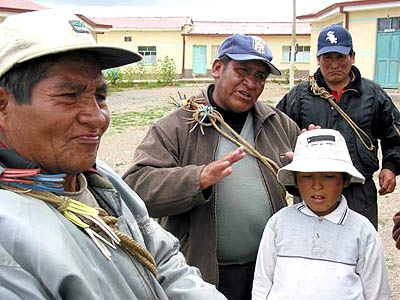 Another Stereotype of the Month entry:
Another Stereotype of the Month entry:
 Another Stereotype of the Month entry:
Another Stereotype of the Month entry:
From the LA Times:
THE WORLD
Bolivia Mired in War of Demands
Some affluent La Paz residents say President Mesa should be more harsh with Indians who use roadblocks to make their voices heard.
By Héctor Tobar
Times Staff Writer
March 13, 2005
LA PAZ, Bolivia — As in many other corners of Latin America, poverty in this capital city climbs uphill.
The poor are stuck in the heights, and the farther down people live in the valley, known as the Chuquiago Marka, "the place where the waters meet" in the Aymara Indian language, the better off they are.
These days, the heights and the lowlands are locked in a dispute that is breathing new life into ethnic prejudices born after the Spanish conquest.
The people of European and mixed heritage ensconced at the bottom of the valley are fed up with the restive Indians in the high-lying suburbs, who perpetually blockade the highways to demand water service and constitutional reform, among other things.
"They're like children," says Ernesto Rocabado, a 41-year-old psychologist at a school in Calacoto, one of the city's most affluent neighborhoods. "They only understand discipline. It hurts me to say this, but it's like in the colonial times. What you really need to do is bring out the whip."
President Carlos Mesa, a son of two La Paz art historians, hoped it wouldn't stay this way when he took power in October 2003 after an Indian-led uprising drove out his predecessor.
On his first day as president, Mesa drove up from La Paz to El Alto, an impoverished suburb that begins at the rim of the La Paz valley and stretches out for miles along the Altiplano highlands. The warm embraces he received that day from Indian leaders are a distant memory.
"The government is creating divisions by denigrating us," said Rolando Viscarra, a resident of El Alto's Senkata neighborhood, where the highway linking La Paz to southern Bolivia is the only strip of asphalt in a sea of unpaved streets. "They've treated us like ignorant peasants. I used to support Mesa, but now I don't."
Viscarra was one of dozens of Senkata residents who gathered around a barricade of scattered boulders and burning tires several days last week. Barricades, the residents say, are "the only thing the paper-pushers" in downtown La Paz understand.
The roadblocks spread throughout the country this month, halting traffic on major highways in six of Bolivia's nine provinces. Some cities faced fuel shortages. Many of the roadblocks were organized by peasants loyal to the Movement to Socialism of Evo Morales, an Aymara Indian and former coca farmer.
Mesa has said he will not use to force to reopen the roads, fearing the bloodbath that could result. So, in a surprise announcement last week, he said he was submitting his letter of resignation to Congress. A short while later, Mesa stepped out on the balcony of the presidential palace with tears in his eyes, to greet the crowd of thousands of La Paz residents who had gathered in Plaza Murillo to ask him to stay in office.
"Una mano dura!" they shouted, "a strong hand," the traditional Latin American cry for imposed social order. They also chanted racially tinged slogans against Morales.
After months of protests, the middle class of La Paz is feeling especially worn down. Many people have grown weary of the marching peasants who follow the zigzagging streets down the steep edges of the valley to stage rallies in the plazas downtown. General strikes and barricades have become part of the urban routine.
"I'm tired of having four people who keep us from moving from one place to another," said Maria Luisa Valverde, an unemployed executive secretary, referring to the indigenous and peasant leaders. "Our children miss school because of the strikes. Sometimes they get stuck there because there's no transportation."
Dressed in business clothes, as if she were still at her old job, Valverde was one of the hundreds of people who had congregated in Plaza Murillo for what became a vigil in support of the president. The vigil continued until Tuesday evening, when Mesa's resignation was rejected by Congress.
Victor Berrillos, the owner of a small La Paz manufacturing shop, came to the plaza to smoke and exchange views with fellow city dwellers as outraged about the situation as he was. Berrillos said he had attended the same school as Mesa.
He said his business was in ruins, thanks to the protests. Like many La Paz residents, he saw Mesa as a "cultured" leader who had brought intelligence and reason to a government increasingly dominated, in Berrillos' eyes, by the uneducated.
"Carlos Mesa finished 12 years of basic education, then many more years of college and graduate school," Berrillos said. "But we have people in Congress, most of them union leaders, who barely completed primary school."
On Tuesday, the day Mesa's supporters danced in Plaza Murillo to celebrate the fact that he was going to stay in office, the mostly Aymara residents of Senkata were still at their barricades, ready to throw stones at any bus or truck that dared to try and pass.
They huddled on the highway in groups of about a dozen, under a traffic light that kept changing needlessly from green to yellow to red and back again.
"We look like peasants," said Juan Quiñajo, a 21-year-old school janitor. "Well, we are peasants. But we want services. We want to be like La Paz."
As in other corners of El Alto, the residents' chief complaint is with the water utility, which has yet to provide water and sewer services to all residents. In January, after a round of barricades and strikes, the residents won an important concession from Mesa: The government would take over the French-owned water company.
But when Mesa didn't nationalize the utility right away, residents took to the streets again.
"Our children get sick because they have to drink water from wells," Angelica Flores said at the roadblock in El Alto, where strong rain can fill the unpaved streets with rancid runoff from local septic tanks.
To prove just how bad the situation was, Quiñajo walked to the school where he worked, a neat little campus set amid adobe houses and gardens of withering potato plants.

El Alto's city government recently built a bathroom for the school. But there is no sewer connection yet, so the new sinks and toilets are unusable.
The children must squat behind the locked lavatory, leaving a patch of grass covered with feces.
"I have to clean this up every few days," Quiñajo said. "This is the filth we have to live with."
His point made, he returned to the barricade.
Rob's comment
I normally don't include comments such as "They're like children" from private citizens such as Ernesto Rocabado. But the crowd's call for a "mano dura" suggests the anti-Indian sentiment is widespread in Bolivia.
Columbus compared the Indians he met to children too, so things haven't changed much in 500 years.
The idea of Indians as children who need discipline is a variation of the savage Indians or uncivilized Indians concept.
|
. . . |

|
All material © copyright its original owners, except where noted.
Original text and pictures © copyright 2007 by Robert Schmidt.
Copyrighted material is posted under the Fair Use provision of the Copyright Act,
which allows copying for nonprofit educational uses including criticism and commentary.
Comments sent to the publisher become the property of Blue Corn Comics
and may be used in other postings without permission.